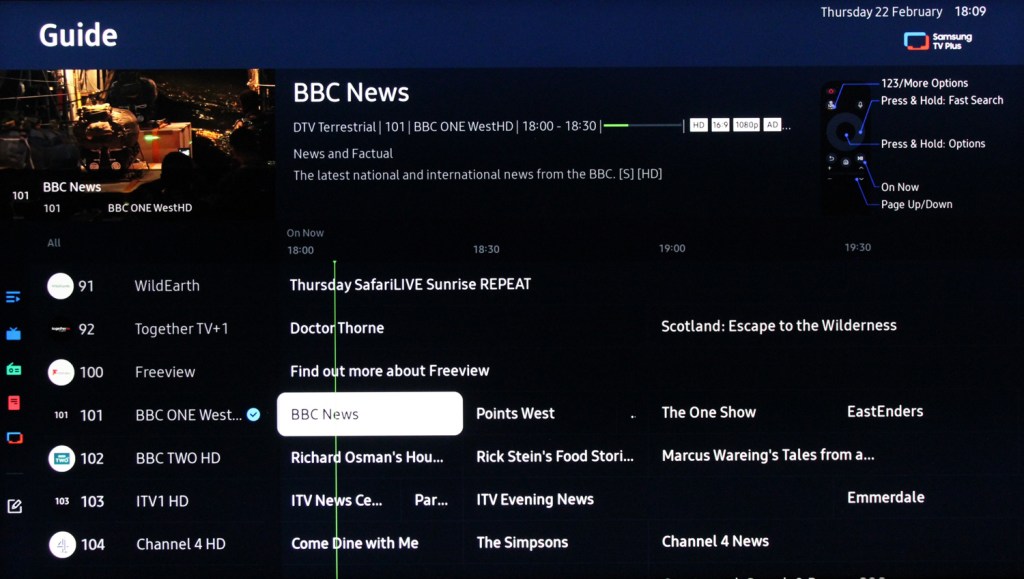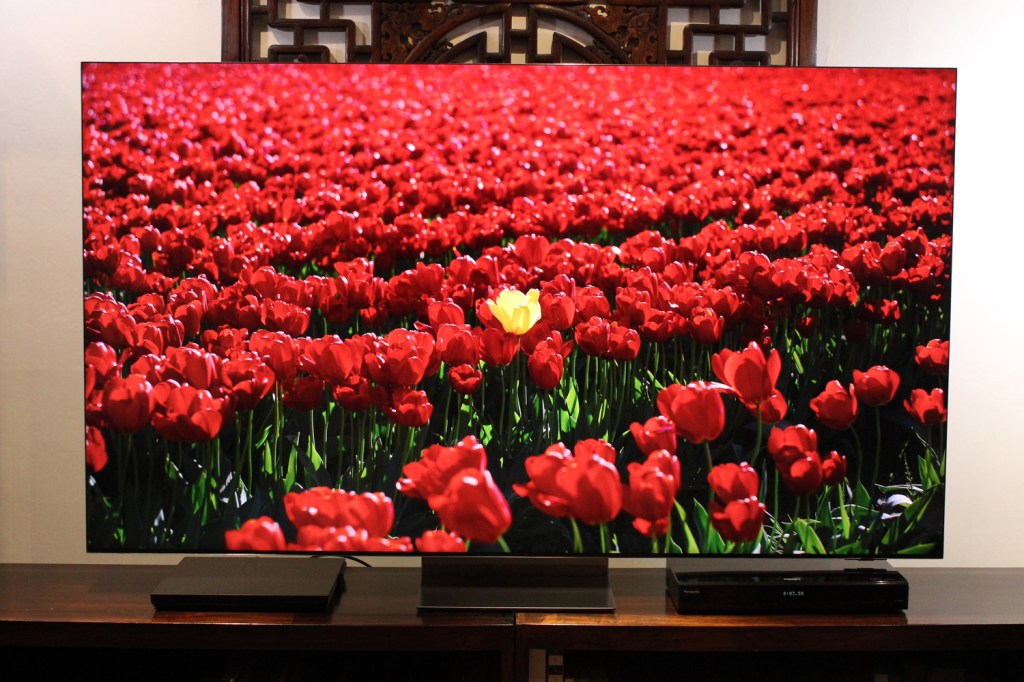Introduction
While actual 8K content remains fairly thin on the ground, that doesn’t mean you can’t benefit from an 8K TV. Samsung has been pioneering the ultra high definition format for years, and the brand’s 8K sets now represent the technological apex of its TV line-up.
This year’s flagship is the QN900D, which not only offers all the usual features associated with the 8K range (such as a striking design, One Connect box, immersive sound system, and cutting-edge gaming features), but also class-leading AI processing for both picture and sound.
The 75in QE75QN900D tested here has an upgraded AI-enhanced chipset built around 512 neural networks. That’s the kind of processing power you’d expect to find on something like a SpaceX Starship. So does this high-end TV have enough smarts to get us to Mars? Let’s find out…
Design and build: floating in mid-air
The QN900D is a definite looker, thanks to the contemporary finish and sleek styling of Samsung’s Infinity One design. The bezels are basically non-existent, and despite the 75in panel size it’s a minuscule 15mm thick, from top to bottom, However, the build quality remains excellent, and the stand’s support is mirrored at the front, giving the impression the picture is just floating in mid-air.
There’s also the option of wall mounting using a 400×400 VESA bracket or Samsung’s Slim Fit wall mount, and the results are tidy. In part this is due to the separate One Connect box, where much of the processing and all the connections are housed. The QN900D looks stunning when wall mounted, with only a single cable attached to the panel itself.
Features: everything but Dolby Vision
The Samsung QN900D is the brand’s flagship TV, and as such it’s fitted with every feature imaginable – with only one major omission. For some reason Samsung continues to shun Dolby Vision, though this TV is so good it wouldn’t really benefit from Dolby’s dynamic metadata HDR format anyway.
That NQ8 AI Gen 3 processor is the headline act, delivering a previously unseen level of picture and sound potential. It’s easily the most sophisticated image processor Samsung has developed to date, and delivers clever deep-learning with 25 times the neural networks and twice the processing speed of the previous version. The QN900D needs this processing power to get the most out of the 7680×4320 panel, which as more than 33 million individual pixels.
AI-enhanced modes include 8K AI Upscaling Pro, which brings out all the details in your content, regardless of resolution. Real Depth Enhancer Pro then maximises control of the Mini LED backlight to give SDR and HDR pictures greater dimensionality, even in fast moving scenes. Finally, a new AI Motion Enhancer Pro mode sharpens and smoothes out moving objects and text. The result is wonderfully fluid movement that’s free of any judder or unwanted artefacts, and while frame interpolation is best avoided for film-based content, it’s great for watching fast sports.
There’s also the new AI Customisation Mode feature, which optimises picture settings based on the TV’s surroundings, content and your personal preferences. AI Energy Mode does the same thing, only with the intention of reducing this big panel’s energy usage.
The panel is illuminated by a Mini LED backlight composed of 1,920 local dimming zones, in a 60 x 32 grid. Samsung’s peerless algorithm employs them all very effectively, with the Quantum Matrix Technology Pro feature redirecting power from darker parts of the picture to brighter areas. This not only improves dynamic range but also energy efficiency.
Samsung’s familiar One Connect box houses four HDMI 2.1 inputs, which support 8K/120Hz and 4K/240Hz signals, along with VRR and ALLM for gaming. It can handle HDR10, HLG, and HDR10+ (Adaptive and Gaming) picture formats, and one of the four supports eARC audio. There are also two USB 2.0 ports, twin tuners, a CI (common interface) slot, an optical digital output, and an Ethernet port. In terms of wireless connectivity there’s Wi-Fi, Bluetooth and AirPlay 2.
The QN900D ships with two remotes – a standard black version and the Solar Cell controller, which offers a stripped-down choice of buttons that cover all the main functionality. It also gives direct access keys to Netflix, Prime Video, Disney+, and Samsung’s TV Plus. Other control options include using the SmartThings app or voice control via the smart assistants.
Samsung’s Tizen-powered user interface remains well-designed and intuitive to navigate, with a comprehensive choice of streaming apps. Samsung has added adds three tabs at the top called For You, Live and Apps; these are intended to make it easier to customise the interface and access recommended content and curated apps.
Performance: class-leading AI picture processing
The Samsung QN900D delivers a remarkable performance, with the new AI-enhanced processing making the most of all those pixels. The resulting images are flawless with a clean, precise and detailed delivery, plus no signs of banding or artefacts. The NeoQLED panel delivers deep blacks and almost no blooming, even with very bright HDR content.
This is in part thanks to those nearly 2,000 independent zones, but also Samsung’s class-leading local dimming algorithm that can produce bright highlights next to pitch blackness. This contrast prowess is enhanced by the exceptional processing that also handles mixed content admirably, ensuring the bright and dark parts of an image are perfectly rendered and given added impact.
Filmmaker Mode provides accurate SDR and HDR pictures, retaining the content creator’s intent. The peak brightness with HDR content reaches an impressive 2,300 nits on a 10% window, and 586 nits on a full field pattern, while the gamut covers 95% of the DCI-P3 colour space.
The QN900D also includes Neo Quantum HDR+ and Auto HDR Remastering to get the best out of all HDR content. The Static option tracks the target curve precisely, retaining artistic intent, while Active analyses the HDR signal and adjusts the brightness . It doesn’t introduce any unwanted clipping, and is useful for watching HDR during the day, or when it appears too dark.
The HDR tone mapping was spot-on in all my tests, taking advantage of the massive brightness and superior processing to produce wonderful HDR imagery. Specular highlights are free of clipping, colours are saturated, blacks are deep, and shadows are detailed without any crushing. The result is stunning picture quality when watching The Creator and Oppenheimer on 4K Blu-ray.
The screen filter is effective at absorbing direct light, as well as rejecting ambient light from the room, thus producing impressive contrast during the day. Screen uniformity is excellent, with no signs of banding, dirty screen effect or colour tinting anywhere. Optimal viewing angles are also wide, with minimal blooming even on contrasty HDR content at extreme angles.
Gaming: pushing the envelope
The Samsung QN900D is an awesome TV for gaming. All if its HDMI inputs support high frame rates such as 8K/120Hz, plus Freesync Premium Pro and Motion Xcelerator Turbo Pro 240Hz for PC gamers. Next-gen console owners can enjoy 4K/120Hz, VRR, and ALLM. Samsung’s Game Hub also provides a choice of cloud gaming services.
Game Mode delivers a lightning fast input lag of 9ms. As a result game play is often amazing, with detailed, smooth and responsive action, plus motion that’s free of tearing or other artefacts, even at the highest frame rates.
The Game Bar pops up to provide information and dedicated settings, as well as menus that users can adjust to personalise their gaming experience.
Sound: epic big-screen sonics

The Samsung QN900D doesn’t just produce stunning pictures, it also sounds incredible for a TV. This is primarily thanks to its impressive 6.2.4-channel speaker layout and 90W of powerful amplification, which results in a soundstage that’s even bigger than the 75in screen – although the added width such a big panel provides also ensures there’s excellent stereo imaging for music.
The speakers are located along the bottom, sides and top. When combined with the Object Tracking Sound Pro processing, the QN900D is able to add extra layers to its sonic delivery, and seamlessly move the audio around and above the screen to match the action on it. There’s also a dedicated centre channel to ensure focused and intelligible dialogue in the most complex mixes.
The woofers built into the rear of the panel help generate a surprisingly deep bass foundation, giving movie soundtracks greater impact. The audio doesn’t just benefit from the AI-enhanced processing, but also Dolby Atmos decoding that adds height, width and depth from supporting soundtracks. Q Symphony can then synch the TV with compatible Samsung soundbars.
Active Voice Amplifier Pro uses the QN900D’s beefed up processing to bring out every word, no matter how complex the mix. The Adaptive Sound Pro also uses this AI-enhanced brain power to process and remaster the sound to ensure it’s rendered as the creators intended.
Samsung QN900D verdict


The Samsung QN900D pushes the technological envelope when it comes to picture and sound on a TV. The NeoQLED panel and Mini LED backlight deliver class-leading contrast, while the new NQ8 AI Gen 3 processor produces exceptional picture quality with SDR and HDR content.
Once you add the powerful and immersive sound system, comprehensive smart system, and cutting-edge gaming features, you’ve got an impressive 8K model that will prove hard to beat this year.
Samsung QN900D technical specifications
| Screen size | 65in, 75in (version tested), 85in |
| Resolution | 7680 x 4320 (8K) |
| HDR formats | HDR10, HLG, HDR10+ Adaptive |
| Inputs | 4 x HDMI 2.1 |
| OS | Tizen |
| Dimensions | 1655x946x15mm (1655x1017x286mm with stand) |
| Weight | 31kg (45kg with stand) |









